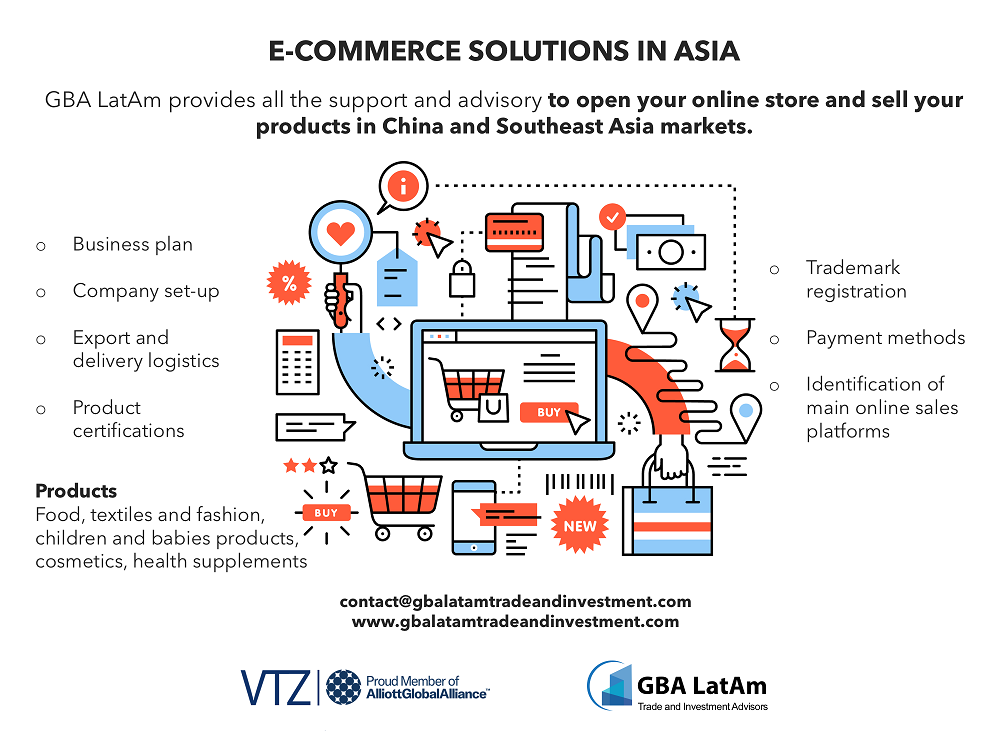Helping customers to navigate e-commerce in Asia
25 May 2021
Susana Munoz, head of the China desk at Vazquez Tercero & Zepeda (VTZ), AGA's law firm member in Mexico, explains the challenges facing SMEs in Asia in the 'new normal' global landscape and how their firm can help.

During the past year, the COVID-19 lockdowns have transformed the global business landscape. In just a few months, retail online sales and cross-border e-commerce became the “new normal”, speeding up the digitalization of the economy and changing consumers behaviour. Entrepreneurs from all over the world, and in particular SMEs, are joining e-commerce, facing new challenges that must be addressed from different disciplines: international trade, tax law, accounting and intellectual property.
According to eMarketer1, during 2020 worldwide retail ecommerce sales grew 27.6%, a total of US$4.289 trillion. Worldwide ecommerce sales reported double-digit growth, with Latin America (36.7%) leading the expansion and countries like Argentina and Singapore reporting growth rates of 79.0% and 71.1% respectively. China leads the world in digital buyers, with over 792 million people. Moreover, eMarketer forecasts a slower growth rate during 2021 (14.3%) as a result of the opening of the economies and a consequent rebound of retail sales.
Data from Shopify2 shows that consumers worldwide are buying items that before were rarely purchased online, like groceries and hygiene products. The pandemic has increased the desire for a better shopping experience, including brands that can deliver more convenient and faster products, in various channels and accessible to different devices. In the coming months we will see more and more companies joining e-commerce platforms, and will have to learn to compete in this dynamic sector.
How can firms support clients to navigate e-commerce?
As e-commerce gains popularity in the retail sector, SMEs need to manage a complex equation of specialized legal and accounting knowledge while focusing on the customers’ shopping experience. In this article, we summarize some of the accounting and legal issues that new sellers will face while starting an e-commerce operation. We have also outlined below the professional advisory services we provide to support foreign exporters who are using e-commerce solutions to break into Asia’s markets.
Business Incorporation:
Companies must be incorporated before starting sales online. Some e-commerce platforms allow cross-border operations with companies incorporated in only one jurisdiction. Purchase and selling of products online merely via a website are illegal with many SMEs failing to comply with this basic requirement.
Calculation of product selling price:
E-commerce platforms charge different fee schemes, among them, flat monthly fees, listing fees, annual fees, transaction fees, advertising and fulfilling order fees. Percentages may vary depending on the category of the product, weight and size. Other factors affecting the selling price of a product may include taxes, tariffs and logistics costs.
Intellectual Property:
Companies must design an intellectual property strategy that can help them protect their brands, designs and patents in all the jurisdictions where their products are sold.
Website/Apps Terms of Use, Cookies Policy, and Privacy Statements:
Companies joining e-commerce need advice on how to limit their liability and assert intellectual property ownership over websites and apps content. Companies should also ensure their websites contain Privacy Statements that meet the standards set in business jurisdiction.
Electronic Payments:
E-commerce platforms accept payments through various methods. SMEs should have an effective accounting that records all fees charged by different vendors, including e-commerce platforms and payment processors like PayPal or Stripe, and exchange rates for sales in different jurisdictions.
Sales Tax:
Due to the nature of cross-border e-commerce, online SMEs may report sales operations in many locations. In some jurisdictions, companies may have to file taxes monthly or quarterly, depending on the business and local regulations.
Inventory Management:
Effective inventory management is key for online sellers’ cash flow. Complications can emerge from stocks located in more than one fulfilment centre or warehouse, management of returns, and related logistics costs.
Consumer Rights:
Companies should be careful to comply with all the requirements under local consumer rights law, which may include description of products, characteristics, identity and address of the sellers, costs and purchase details, information about delivery, assembly instructions, exchange and refunds.
REFERENCES
1 2021 Global Ecommerce Update 2021, eMarketer.
2 2021 The Future of Ecommerce Report 2021, ShopifyPlus.
For more information contact Susana Munoz at susana@vtz.mx
About Vazquez Tercero & Zepeda (VTZ):
Vazquez Tercero & Zepeda (VTZ) is a law firm specialising in international trade, customs law, tax law, regulatory (sanitary & food-safety law), commercial, and administrative litigation in Mexico City, Guadalajara, Monterrey, Matamoros, Puebla, Los Cabos, Leon, Tijuana, Reynosa and Hong Kong, China.
Our mission is clear: to solve complex legal problems and provide legal certainty to the businesses and commercial operations of companies, domestic or international, in Mexico.
Through our VTZ China Desk, we offer e-commerce solutions and advisory for companies interested in selling their products on e-commerce platforms in China and Southeast Asia .
Working in conjunction with GBA LatAm, the Trade and Investment Advisors, you can see below the specialist advisory services VTZ offers to entrepreneurs who are exporting and using e-commerce solutions to break into Asia’s markets.
